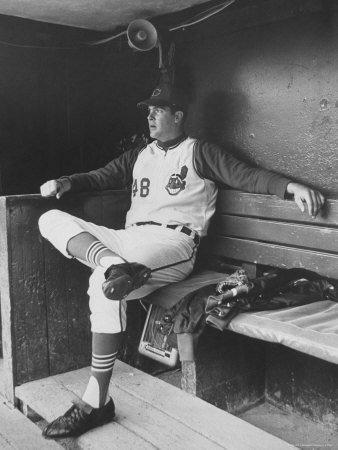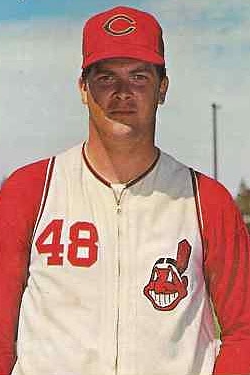 Is it possible for a big league pitcher to earn a save in a game he started?
Is it possible for a big league pitcher to earn a save in a game he started?
While that question marinates, here is another one:
How can a pitcher who is responsible for all of the opponents’ 27 outs in a regulation game not be credited with throwing a complete game?
For the decade of the 1960s (which it says here ended with the Watergate scandal, in 1972), “Sudden Sam” McDowell was the dominant figure on the Cleveland Indians ball club. His legendary fastball helped make his sharp-breaking curve and slider appear unhittable. McDowell was ticketed for Cooperstown, until his well-documented battle with alcoholism helped to undermine and finally end his career.
Lost in the laments of wasted promise is the fact that Sudden Sam did have some dominant seasons for some pretty crappy Indians teams. He was a strikeout pitcher who was an All-Star several times. He gave up a lot of walks, yet commonly led or nearly led the American League in earned run average. In hindsight, McDowell’s sabermetric bona fides were legitimate.
 1970 was one of those really good seasons for Sudden Sam. He’d end up with 20 wins, 19 complete games, 304 strikeouts (in 305 innings pitched) and a 2.92 ERA for the sub-.500 Tribe.
1970 was one of those really good seasons for Sudden Sam. He’d end up with 20 wins, 19 complete games, 304 strikeouts (in 305 innings pitched) and a 2.92 ERA for the sub-.500 Tribe.
On July 6, McDowell’s opponent was the equally-lowly Washington Senators, managed by all-time star Ted Williams. Much of the lineup was nondescript; Cleveland fans will appreciate that the ace of their staff was future Tribesman Dick Bosman. The future no-hit Tribe pitcher would finish the season 16-12. Jackie Brown was a relief pitcher for the Senators, and former Indians second baseman (and future radio announcer) Dave Nelson was on the roster as well.
 The big man in the heart of the Washington batting order was first baseman Frank Howard. Hailing from Columbus, Ohio, Howard was variously known as “Hondo”, “The Washington Monument”, and “The Capitol Punisher” (ha). The 6’8” Howard had been an All-American in both baseball and basketball at The Ohio State University in the late 1950s, just prior to the Jerry Lucas era.
The big man in the heart of the Washington batting order was first baseman Frank Howard. Hailing from Columbus, Ohio, Howard was variously known as “Hondo”, “The Washington Monument”, and “The Capitol Punisher” (ha). The 6’8” Howard had been an All-American in both baseball and basketball at The Ohio State University in the late 1950s, just prior to the Jerry Lucas era.
Sam McDowell was typically his toughest on the better hitters in the A.L. (It was when he overmatched his opponent that Sudden Sam tended to abandon his fastball and try to get hitters out with less than his best stuff.) A very large exception to Sam’s dominance was Frank Howard.
On this Independence Day Weekend evening in front of a home crowd of 12,000, McDowell found himself in trouble early. He allowed one-out singles to LF Tom Grieve and Howard before RF Rick Reichardt drove in a run with a single to center field. 3B Aurelio Rodriguez walked, and C Paul Casanova hit a sacrifice fly to center. 2-0 Senators.
The Tribe went meekly in their half of the first against P Joe Coleman.
The Washington second was vintage Sudden Sam. He struck out CF Ed Stroud, swinging. Then he walked the pitcher, Coleman. SS Eddie Brinkman hit a pop fly to second for out number two. A Grieve single put runners at first and second with two out. Frank Howard came up to bat.
A passed ball by star rookie C Ray Fosse opened up first base for McDowell, who promptly issued an intentional pass to Howard. Reichardt ended the inning by striking out.
In the top of the third, the Senators added 2 runs to their lead. 4-0 Washington.
Indians 3B Graig Nettles got the home team on the board with a third inning home run that followed a Heidemann bunt single. 4-2 Senators.
RF Duke Sims brought the Tribe closer with a home run to right center in the fourth. He had been supplanted as the Indians’ catcher by the rookie Fosse, but 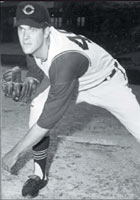 Sims could still play. My earliest Indians memory is of Sims receiving a throw from left field as a large, late 1960s crowd stood in unison. I don’t even remember the outcome of the play at the plate! 4-3 Senators.
Sims could still play. My earliest Indians memory is of Sims receiving a throw from left field as a large, late 1960s crowd stood in unison. I don’t even remember the outcome of the play at the plate! 4-3 Senators.
As many starting pitchers are wont to do, Sam McDowell settled down and pitched efficiently and effectively after giving up a few early runs. He gave his team a chance to get back in the game.
And come back they did. In the bottom of the sixth, Nettles doubled to right off of Coleman. A wild pitch advanced him to third. Veteran CF Vada Pinson singled to center, scoring Nettles. After Fosse hit into a force out, Duke Sims clobbered his second home run. 6-4 Indians.
McDowell sailed into the top of the eighth. Stroud singled to lead off the inning. After a pop out, Brinkman singled to right to put men on first and second. Sudden Sam bore down- and let loose a wild pitch. He recovered to retire Grieve on strikes. Two out, men on second and third.
And Frank Howard strode to the plate.
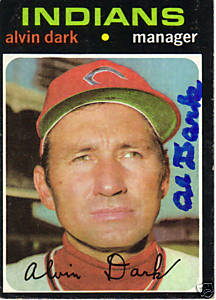 Indians manager Alvin Dark made his purposeful walk to the mound. He signaled to the bullpen for reliever and Wooster, OH native Dean Chance. But instead of sending McDowell to the dugout, he made him the new second baseman. 2B Eddie Leon was moved to 3B.
Indians manager Alvin Dark made his purposeful walk to the mound. He signaled to the bullpen for reliever and Wooster, OH native Dean Chance. But instead of sending McDowell to the dugout, he made him the new second baseman. 2B Eddie Leon was moved to 3B.
McDowell later noted that his team was as shocked as everyone else in the stadium. But Dark had told him before the game that he might move him briefly and allow a reliever to pitch to Howard late in the game. McDowell, however, assumed the move would be to first base or right field- positions he had played in high school. He did not foresee becoming a novice, lefty second baseman!
Dark’s move was to intentionally walk Howard. His thinking was that if Ted Williams removed the right-handed Reichardt from the game in favor of a lefty, McDowell would come back as pitcher and face the pinch hitter. Williams left Reichardt in the game. Do you think the ball found Sam McDowell? The shortstop Heidemann kept hollering at him, to make sure he covered second.
Yep- the ball found Sam. And it found the transplanted Leon as well. Reichardt sent a sharp grounder to third, which Leon snared. He automatically threw to second for the force- even though there was plenty of time to throw across to first. McDowell was waiting at second - with Big Frank Howard bearing down on him. Sam lost sight of the ball for a brief moment. He knew the throw was a little low so he dropped to his knees- and caught the ball for the force.
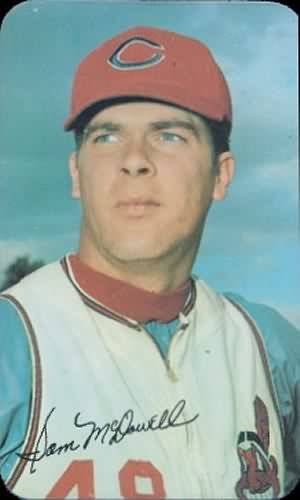 To put a finishing touch on the game, Sudden Sam came back out to pitch the ninth inning and struck out the side (strikeouts 13, 14 and 15). The Indians won, 6-4, improving the Tribe ace's record to 12-4! Frank Howard finished the game 2 for 2 with 3 walks and a run scored.
To put a finishing touch on the game, Sudden Sam came back out to pitch the ninth inning and struck out the side (strikeouts 13, 14 and 15). The Indians won, 6-4, improving the Tribe ace's record to 12-4! Frank Howard finished the game 2 for 2 with 3 walks and a run scored.
The part of the story that doesn’t get talked about is the sequel, in September, at RFK Stadium in Washington, D.C. In the sixth inning, McDowell and the Indians were down, 1-0. Washington had runners on first and second with one out. Alvin Dark moved Sam to first, and brought in Chance to face Howard. This time, the strategy failed. Howard hit a ball- yes, to McDowell- and was safe on an infield single. Reichardt made Dark and the Indians pay, driving in two runs. McDowell returned to the mound in the seventh inning and finished the game.
Thanks to Retrosheet.org, we learn that Alvin Dark actually employed the strategy of moving the pitcher to another position and then back to the mound five times as manager, between 1953 and September 1970! McDowell was the last, and the only pitcher to be switched as such twice.
In looking back at the July 6, 1970 game: Sam McDowell was the winning pitcher. Therefore, he was not eligible to earn a save. But remember, he recorded the last out of the eighth inning- the only out for which he was not pitching. Technically, he was responsible for all 27 Senators outs, but was not credited with a complete game. Additionally, he was credited with one appearance.
He is listed in the box score’s pitching totals twice, sandwiched around Dean Chance. There is a ‘W’ after McDowell’s name, in both places.
Thank you for reading.
Sources include Retrosheet.org, baseball-reference.com, Tales from the Tribe Dugout (Russell Schneider) and The Cleveland Indians Encyclopedia (Russell Schneider).
